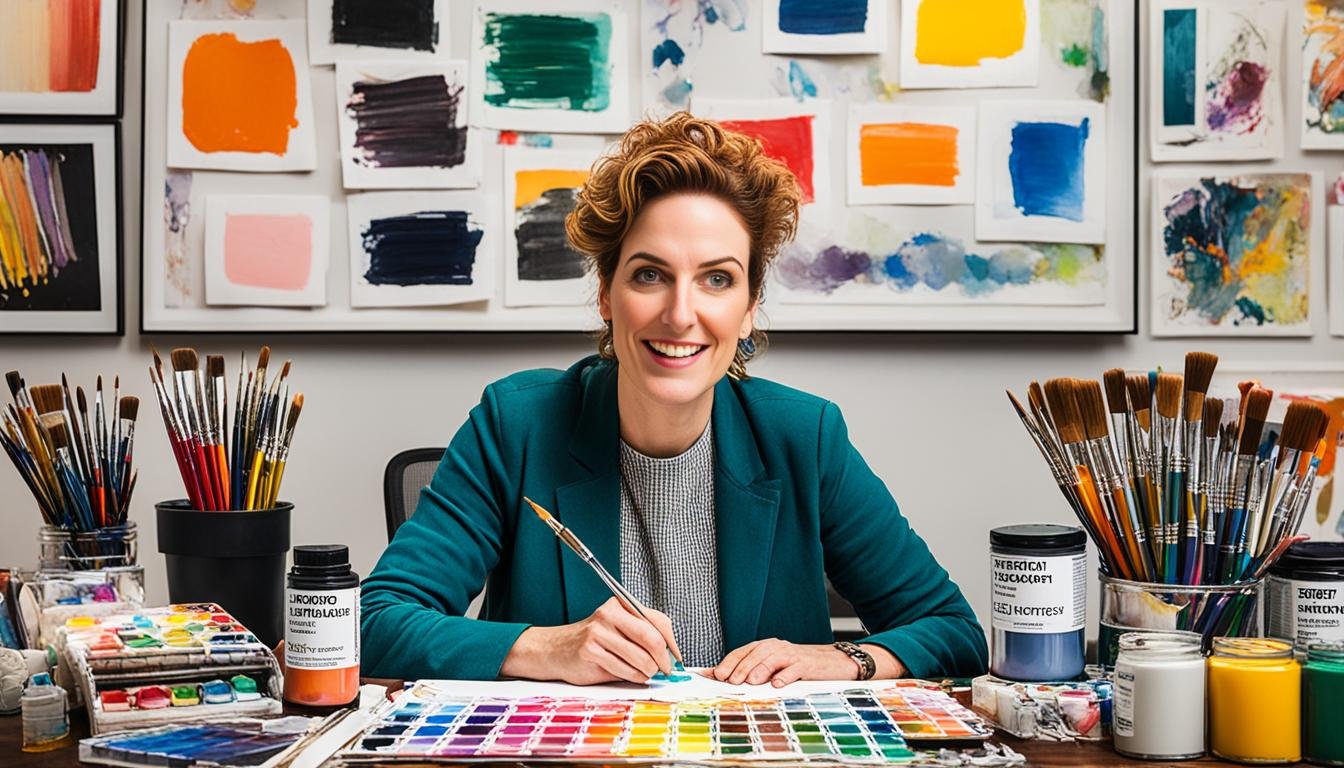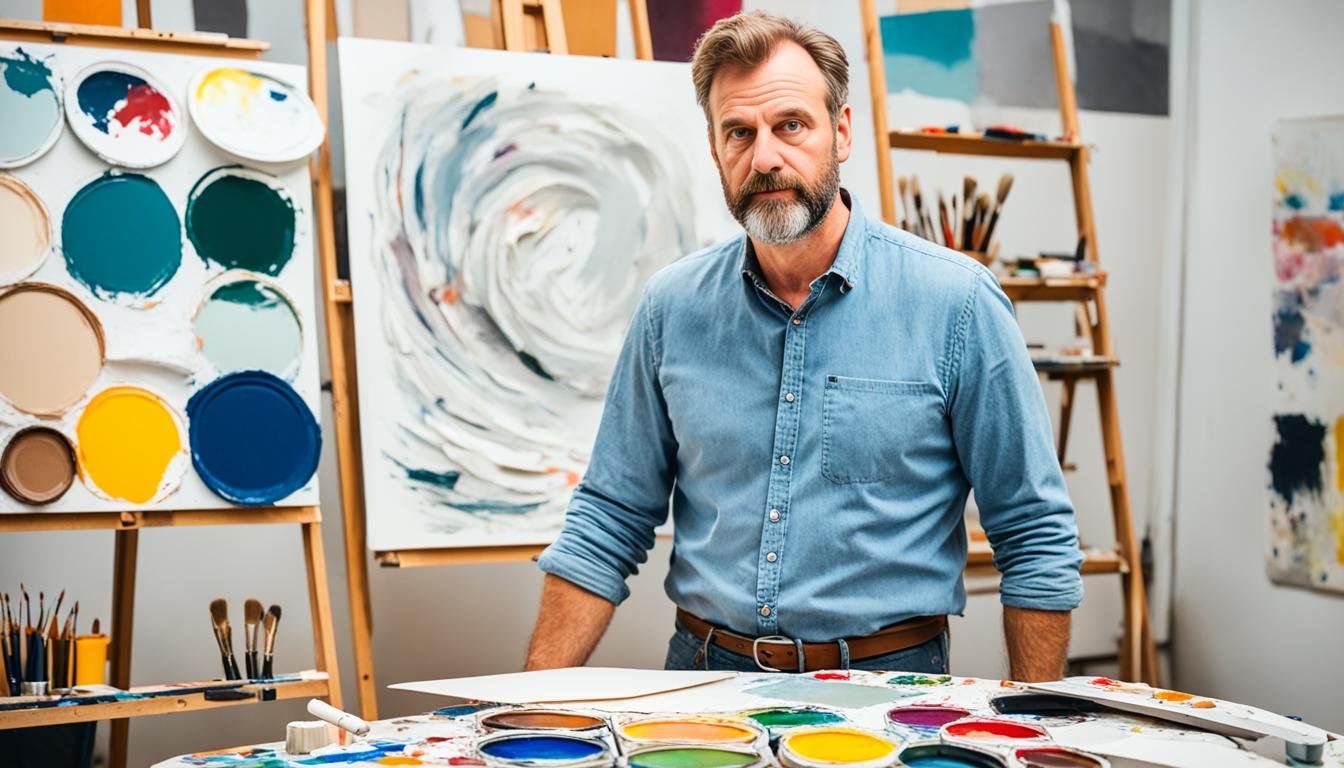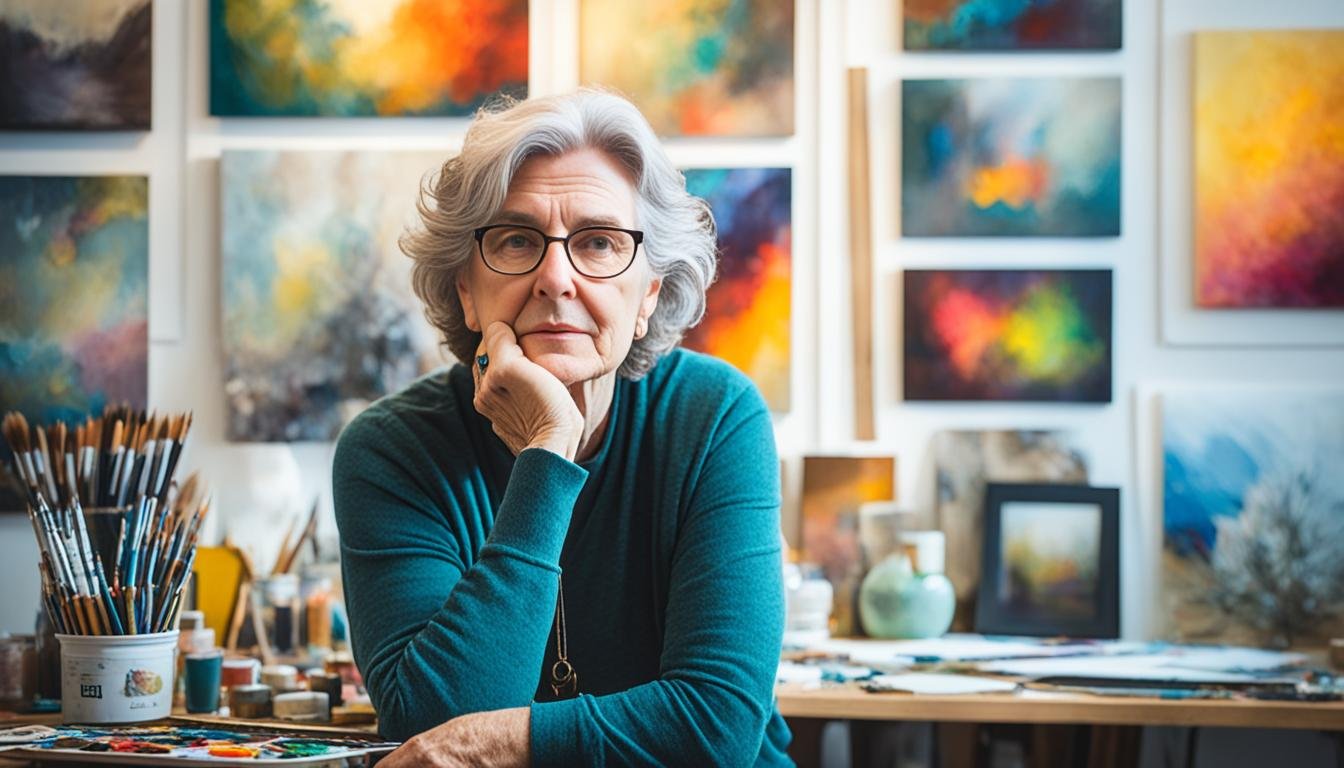Interview Questions For Artists – What to Expect?
The art world is more than just creating beautiful work. It also involves engaging with others through interviews. These interviews let artists connect with people like potential partners or galleries. They help artists show who they are and what makes their art special. Knowing what questions to expect is key to being ready for these important talks.
In artist interviews, talking about your art is just the start. You also need to share your vision, show you can adapt, and explain how you create. It’s a chance to not just talk about your work but share your love for art and what inspires you. Being prepared for this can make a big difference in how people see you in the art world.
Key Takeaways
- Understand the significance of interviews in the art world engagement.
- Prepare to articulate your artistic vision fluently during interviews.
- Showcase your adaptability and creative process effectively.
- Focus on establishing a strong personal brand.
- Aim for thorough artist interview preparation to stand out.
Introduction to Artist Interviews
Artist interviews are key in the art world. They let artists talk to important people and groups. Knowing how to do interviews right is very important. A good interview can boost an artist’s career. It helps in making connections in the art industry networking and improving their personal brand.
Importance of Interviews in the Art World
Interviews are vital for connecting artists with the art community. They let gallerists, collectors, and curators see the artist’s process and vision.
By giving thoughtful answers, artists can show off their skills and career plans. Doing Interview preparation for artists well is key. It shows artists are not just skilled but also good at sharing their artistic ideas.
Showcasing Your Artistic Vision
Explaining your art’s vision is crucial in interviews. It’s the chance to talk about what inspires your work. This helps in personal brand building. It makes your identity clear to those listening.
Sharing your artistic journey and talking about your work’s themes can make a strong impact. Good artist’s interview fundamentals and interview preparation for artists can help you stand out. It catches the attention of potential employers, galleries, and collectors.
Common Interview Questions for Artists
Artists face a wide range of questions in interviews. These can go from personal to professional topics. Knowing the common questions can help an artist be ready and make a good impression.
Personal and Background Questions
In any artist’s interview, personal history is a big focus. Interviewers want to know what has inspired your art. They’ll ask about the motivations behind your creative journey. Some common questions are:
- What motivated you to pursue a career in art?
- Can you describe your early influences and how they shaped your artistic journey?
- How has your cultural background influenced your work?
Technical Skill and Technique Queries
Interviewers also want to know about your art skills. They might ask about the tools and methods you use. Here are a few technical questions you might face:
- What mediums do you primarily work with, and why?
- Can you detail your process from concept to finished piece?
- What challenges have you faced in your work, and how did you overcome them?
Discussing Artistic Influences
Interviewers find it important to talk about artistic influences. It helps to understand your work better. They might ask you about your favorite artists and movements. Here are some questions you could hear:
- Which artists have had the most significant impact on your work, and why?
- Are there any art movements or historical periods that you find particularly inspiring?
- How do external influences shape your creative process?
| Type of Question | Example Query |
|---|---|
| Personal and Background | Who inspired you to start creating art? |
| Technical Skill and Technique | Could you explain your process for selecting and using materials? |
| Artistic Influences | Which contemporary artists do you admire? |
Creative Process and Conceptual Questions
Artist interviews often dive into how they create and what ideas they use. They look into what makes the art meaningful. This helps people see what drives the artist and their work.
Exploring Your Inspirations
One key part of interviews is finding where artists get their ideas. It could be from nature, their past, or what other artists do. This process shows a lot about how an artist thinks and works.
Articulating Your Artistic Themes
Talking about the main ideas of their work is crucial for artists. It lets us see into their creative process. Well-explained themes help others understand and feel the art better.
| Interview Focus | Description |
|---|---|
| Inspiration Sources | Understanding the origin of ideas and how they influence the artistic process. |
| Artistic Themes | Communicating the core themes and messages within the artwork. |
Portfolio Review: What to Expect
The portfolio review is key in an artist’s interview. It showcases their top pieces. Artists should get ready well for this part. They need to understand how to show and take feedback about their work.
Presenting Your Best Work
Choose pieces that show your strengths and variety. Pick works that fit the job or chance you want. Always choose quality over quantity. A good artistic work presentation tells a story of your creative growth. It shows your changing skills and personal style.
- Choose varied pieces that show range.
- Include works that received accolades or were displayed in notable exhibitions.
- Arrange your work chronologically to showcase your progression.
Handling Critique and Feedback
In a portfolio review, being open to constructive feedback reception is important. Critique can help you grow and see your work in new ways. Having a positive view of feedback shows you want to get better and learn new things.
- Listen actively and take notes.
- Ask clarifying questions to understand the critique fully.
- Reflect on the feedback and consider how it can enhance your artistry.
| Key Aspects | Importance |
|---|---|
| Curating Varied Pieces | Shows range and versatility. |
| Chronological Arrangement | Illustrates your artistic growth over time. |
| Receptiveness to Feedback | Demonstrates adaptability and willingness to grow. |
Keep these portfolio review insights in mind. They can help you make a lasting mark on those looking at your work.
Collaboration and Interpersonal Skills
In the art world, artists often work together in collaborative art projects with galleries and other artists. These joint efforts make the art better and help artists deal with different personalities in the field.
During job interviews, questions often center around art industry interpersonal skills. They ask about past co-ops. For instance, how do artists share their ideas with others, or how do they take feedback well? Here are the classic questions:
- How do you approach collaborative art projects?
- Can you give an example of a successful collaboration and your role in it?
- How do you handle creative differences within a team?
Answering these can show why you’re good at teamwork. It helps to be ready for such questions.
| Skills | Relevance |
|---|---|
| Communication | Effectively conveying ideas to collaborators |
| Adaptability | Flexibly integrating feedback |
| Teamwork | Working harmoniously within diverse groups |
Understanding how to work together effectively is key in art. It ensures an artist fits well in teams, adding to the group’s work in a positive way.
Discussing Artistic Inspiration and Techniques
When talking to artists, we often discuss what inspires them and their special techniques. This gives us a peek into the things that spark their creativity and how they turn their ideas into art. Learning about these can make us appreciate their work even more.
Sources of Artistic Inspiration
Artists find inspiration in many different places. This can be from their own feelings and life events to big, cultural topics. Books, history, and nature also play big parts. For example, Salvador Dalí was inspired by his dreams. He painted surreal scenes that came from his inner thoughts. Talking about these inspirations helps show how rich and varied an artist’s work can be.
Preferred Artistic Techniques
Discussing technique is also key. Artists share what kind of methods they like. This might be classic oil painting, soft watercolors, or digital art. Each way of creating contributes to their personal style. For instance, Jackson Pollock’s unique way of painting became famous in the art world. By sharing how they work, artists let us see the link between their technique and their artistic goals.
Skill Assessment and Problem-Solving Abilities
When artists are interviewed, their skills and problem-solving are key. Interviewers want to know how well the artist uses different tools and handles artistic issues. This part will show the best ways for artists to prove their skills and smarts at solving problems.
Demonstrating Mastery of Mediums
Being skilled in their artistic medium mastery is very important for artists. They need to show they know a lot about the tools they use. A painter might talk about different types of brushes. Or a sculptor could share how they mix materials in new ways. Using different mediums well shows an artist is very talented.
Approach to Overcoming Creative Blocks
Sharing creative problem-solving techniques is just as crucial. Artists often hit creative blocks. How they deal with these problems shows a lot about them. Talking about times they changed a project or added new ideas to get back on track can be very insightful.
| Skills Assessed | Importance | Examples |
|---|---|---|
| Artistic Medium Mastery | High | Technical brushwork in painting, innovative material use in sculpture |
| Creative Problem-Solving Techniques | High | Overcoming creative blocks, pivoting project direction |
In an artist’s portfolio, being very good and able to change are crucial. Showcasing skills and how they handle problems will really impress during interviews.
Career Trajectory and Professional Goals
Understanding an artist’s career can show how they grow over time and what they aim for. Artists explain their story to share how their career has developed.
Artists often talk about key moments in their learning, like getting degrees. They also mention shows and prizes, which show how others see their work.
They should also talk about what they hope to achieve in their career. This might be getting their work into galleries, making a big impact, or getting special jobs. Sharing these dreams shows they are determined and have a clear path ahead.
Looking back on their journey helps artists see the big turning points in their careers. They might talk about teachers who inspired them, or people they worked with. These moments often lead to where they are now.
Telling their whole story and their future dreams shows how serious they are about their work. This can impress people who might hire or support them in the art world.
Conclusion
Being prepared is the secret to a great artist interview. Knowing the kinds of questions you’ll face and sharing your vision and work well can change your game. Thinking deeply about yourself and your art helps you make a mark in the art scene. Having a smart plan for interviews helps you show off your creativity and how you handle challenges. It also highlights your dedication to getting better.
To market your art well in an interview, you need to do more than just show what you can do. You should share stories that touch people at galleries, who collect, or who work with artists. Each piece you present should talk about your artist’s path, your skills, and how you solve problems in creative ways. Take feedback as a chance to get better. Explain confidently how advice helps you improve. Having a good attitude towards criticism can turn it into chances to grow and earn respect in the art world.
To sum up, getting good at interviews is key. It lets you talk about what you love, how you create, and what you’ve achieved. Being ready and open can help you grab chances, make important contacts, and establish yourself in the tough art market. Remember these tips to confidently face any interview and show the world who you are as an artist.


